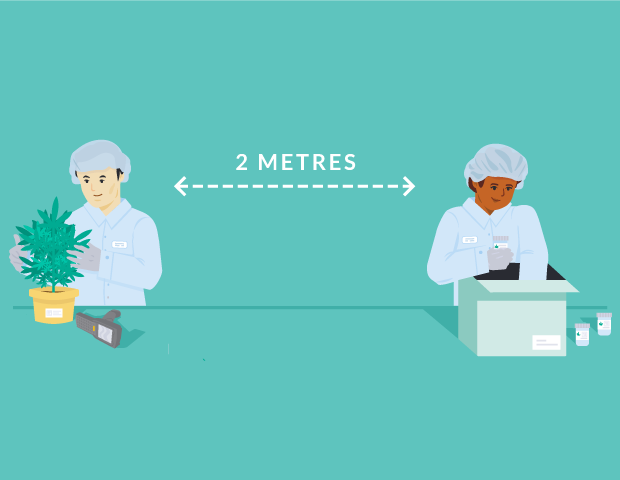
Uncategorized
Minimizing COVID-19 Transmission in Cannabis Facilities
What can you do to reduce the transmission of COVID-19 in your cannabis facilities and retail stores? We’ve compiled some of the processes that have been adopted by Canadian companies managing employee and public safety while supporting an increased sales volume as Canadians stock up on cannabis. We’ve also included resources and key takeaways from The Centers for Disease Control and Prevention (CDC), the Government of Canada, and the World Health Organization (WHO) that can help keep you and your employees safe.
Key takeaways and communications from Canadian cannabis companies
- We are aware of one major cannabis facility that is quarantining half of their staff to ensure that they have employees available should COVID-19 enter their facility.
- In a LinkedIn post, Mandesh Dosanjh, CEO of Pure Sunfarms outlines several methods they are utilizing, including “screening employees as they arrive on site.”
- Aqualitas shared communication about their efforts, which include crew rotations and the suspension of all business travel and non-emergency repair visitors.
- WeedMD is actively instituting new measures as the situation develops and has summarized their current efforts online to keep everyone informed.
- Aleafia Health has launched a next-day home delivery service for medical cannabis patients in the Greater Golden Horseshoe Region.
- Torkin Manes has created a list of cannabis retailers and the measure they’re implementing, including Click & Collect, adjusted hours, limiting the number of customers, and creating distance in-store — this list will be updated on an ongoing basis.
Key takeaways from online resources
- Identify a coordinator who will be in charge of COVID-19-related issues.
- Ensure your HR policies are up to date and clearly communicated.
- Implement social distancing standards and procedures.
- Clean! Regularly disinfect workstations and high-touch surfaces, including scanner guns, scales, printers, and keyboards.
- Consider staggered shift work as a way to reduce the total headcount in your facility at any one time.
- Make a plan of action for increased absenteeism.
- Do what you can to support your employees’ mental health and to offer them support.
- Assess your essential functions – prepare to be flexible and agile to prioritize the core needs of your business and obtain the materials and services you need to function.
Infrastructure, an excerpt from Canada.ca:
- Provide access to handwashing facilities and place hand sanitizing dispensers in prominent locations throughout the workplace/business, if possible;
- Provide additional respiratory etiquette supplies such as tissues, lined waste container, and hand hygiene products/supplies;
- Consider increasing the spatial separation between desks and workstations as well as individuals (e.g., employees, customers) from each other, ideally a 2 metre separation or use a physical barrier (e.g., cubicle, Plexiglas window), if possible;
- Enhance your environmental cleaning procedures and protocols with a special attention to high-touch surfaces and objects.
Tips for individuals
Government of Canada
Cleaning guidelines
CDC
How to Protect Yourself
Handwashing tips
Coughing and sneezing etiquette
Guidelines for businesses
Government of Canada
Risk-informed decision-making guidelines for workplaces and businesses during the COVID-19 pandemic
Resources for Canadian Businesses
Coronavirus disease (COVID-19): Prevention and risks
WHO
Getting Your Workplace Ready for COVID-19
The upside
Canadian Cannabis Regulations require that cannabis is tested for microbial and chemical contaminants, ensuring that the cannabis consumers receive is safe for consumption.
As a result of strict standard operating procedures that include the regular use of personal protective equipment, cannabis producers are in a good position to protect their employees. Some companies, including Hexo Corp., are donating N95 masks and personal protective equipment to Canadian healthcare workers, while Organigram “has committed to donate 500L of ethanol from [their] production production facility to be repurposed into hand sanitizer for distribution within [their] local health care network in New Brunswick.” Industry leaders like John Slaughter of High North Laboratories, Daniel Sax of Sensi Properties, and George Smitherman of the Cannabis Council of Canada, are actively reaching out to the government to highlight the potential of cannabis facilities and laboratories to assist with combating the COVID-19 pandemic.
In this time of anxiety and hardship, it is easy to see the strength of our community. We hope that you all stay healthy and stay hopeful.